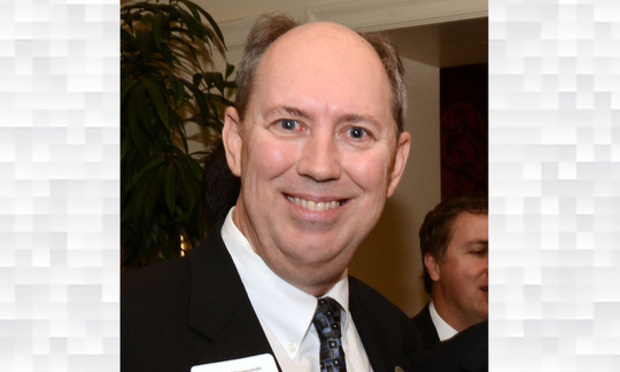Appeal Puts Spotlight on Fee Claims Against Lenders After Foreclosure
The case involves a demand for reimbursement for a condo association's collection efforts targeting U.S. Bank.
April 09, 2018 at 01:47 PM
3 minute read
 Judge Mark W. Klingensmith
Judge Mark W. Klingensmith
A question about attorney fees for collection efforts pursued after a foreclosure sale puts Florida's safe harbor provisions in the spotlight.
The state's safe harbor provision protects lenders recovering property after foreclosure from paying the full amount of overdue association dues. Under the rule, lenders pay a year's worth of dues or 1 percent of the mortgage, whichever is less.
But in a case reaching the Fourth District Court of Appeal, a community association demanded more.
Emerald Estates Community Association sought to collect more than $6,000 in attorney fees and costs, alleging it was forced to undertake collection efforts after the buyer, U.S. Bank N.A., refused to pay.
“We're not arguing about safe harbor,” association attorney Lourdes Ferrer said Monday. “What we're saying is, 'You owe and failed to pay the fees from the time you took title. Because of that, we're entitled to fees.' ”
Ferrer said it took more than seven months for the bank to pay the overdue association fees. She said the new owner also incurred multiple other violations during that period.
“ This is a common problem when banks take title to property. They obtain the property via foreclosure, and then they don't do anything,” she said. “The banks won't pay or maintain while they're waiting to sell the property. In this case, that's what happened.”
Ferrer was co-counsel with Michael T. Ross of the Law Office of Michael T. Ross P.A. in Hollywood.
Bank's attorney Alexzander D. Gonano of Gonano & Harrell in Fort Pierce did not respond to requests for comment by deadline.
U.S. Bank purchased the foreclosed property at Emerald Estates at Weston in March 2014. Months after that sale closed, the association sent an estoppel letter for 12 months' worth of unpaid assessments accrued before the bank took title.
The association also argued the bank owed court costs and fees for forcing the association's hand on collection efforts. U.S. Bank paid under protest but filed a complaint against Emerald Estates, denying responsibility for any attorney fees or court costs.
Broward Circuit Judge Carol-Lisa Phillips agreed and granted summary judgment in the bank's favor.
On appeal, it was up to the Fourth DCA to determine the timing of costs and whether the association incurred them before or after U.S. Bank took title.
“U.S. Bank presented no evidence at the hearing regarding when these fees and costs actually accrued,” Judge Mark W. Klingensmith wrote in a unanimous decision with Judges Martha C. Warner and Cory J. Ciklin concurring. Because “a genuine issue of material fact remained … we reverse the entry of summary judgment and remand for further proceedings.”
Now, Phillips will have to unravel the timeline in a case that's caught the attention of community association and lender attorneys.
“It's interesting that the appellate court did not proclaim that the former mortgage holder, now buyer, is responsible for attorney fees accruing after the certificate of title. However, that is the essence of the holding because otherwise there would be no need to remand,” said Michael Gelfand, a board-certified real estate lawyer who is not involved in the litigation.
“Why would they make more work for the trial court? If the association could not collect post-certificate, they would simply have affirmed. By remanding, that is an acknowledgement that the association has a legal claim to post-certificate-of-title attorney fees.”
This content has been archived. It is available through our partners, LexisNexis® and Bloomberg Law.
To view this content, please continue to their sites.
Not a Lexis Subscriber?
Subscribe Now
Not a Bloomberg Law Subscriber?
Subscribe Now
NOT FOR REPRINT
© 2025 ALM Global, LLC, All Rights Reserved. Request academic re-use from www.copyright.com. All other uses, submit a request to [email protected]. For more information visit Asset & Logo Licensing.
You Might Like
View All
South Florida Real Estate Lawyers See More Deals Flow, But Concerns Linger
6 minute read
Vedder Price Shareholder Javier Lopez Appointed to Miami Planning, Zoning & Appeals Board
2 minute read
Real Estate Trends to Watch in 2025: Restructuring, Growth, and Challenges in South Florida
3 minute readTrending Stories
- 1States Accuse Trump of Thwarting Court's Funding Restoration Order
- 2Microsoft Becomes Latest Tech Company to Face Claims of Stealing Marketing Commissions From Influencers
- 3Coral Gables Attorney Busted for Stalking Lawyer
- 4Trump's DOJ Delays Releasing Jan. 6 FBI Agents List Under Consent Order
- 5Securities Report Says That 2024 Settlements Passed a Total of $5.2B
Who Got The Work
J. Brugh Lower of Gibbons has entered an appearance for industrial equipment supplier Devco Corporation in a pending trademark infringement lawsuit. The suit, accusing the defendant of selling knock-off Graco products, was filed Dec. 18 in New Jersey District Court by Rivkin Radler on behalf of Graco Inc. and Graco Minnesota. The case, assigned to U.S. District Judge Zahid N. Quraishi, is 3:24-cv-11294, Graco Inc. et al v. Devco Corporation.
Who Got The Work
Rebecca Maller-Stein and Kent A. Yalowitz of Arnold & Porter Kaye Scholer have entered their appearances for Hanaco Venture Capital and its executives, Lior Prosor and David Frankel, in a pending securities lawsuit. The action, filed on Dec. 24 in New York Southern District Court by Zell, Aron & Co. on behalf of Goldeneye Advisors, accuses the defendants of negligently and fraudulently managing the plaintiff's $1 million investment. The case, assigned to U.S. District Judge Vernon S. Broderick, is 1:24-cv-09918, Goldeneye Advisors, LLC v. Hanaco Venture Capital, Ltd. et al.
Who Got The Work
Attorneys from A&O Shearman has stepped in as defense counsel for Toronto-Dominion Bank and other defendants in a pending securities class action. The suit, filed Dec. 11 in New York Southern District Court by Bleichmar Fonti & Auld, accuses the defendants of concealing the bank's 'pervasive' deficiencies in regards to its compliance with the Bank Secrecy Act and the quality of its anti-money laundering controls. The case, assigned to U.S. District Judge Arun Subramanian, is 1:24-cv-09445, Gonzalez v. The Toronto-Dominion Bank et al.
Who Got The Work
Crown Castle International, a Pennsylvania company providing shared communications infrastructure, has turned to Luke D. Wolf of Gordon Rees Scully Mansukhani to fend off a pending breach-of-contract lawsuit. The court action, filed Nov. 25 in Michigan Eastern District Court by Hooper Hathaway PC on behalf of The Town Residences LLC, accuses Crown Castle of failing to transfer approximately $30,000 in utility payments from T-Mobile in breach of a roof-top lease and assignment agreement. The case, assigned to U.S. District Judge Susan K. Declercq, is 2:24-cv-13131, The Town Residences LLC v. T-Mobile US, Inc. et al.
Who Got The Work
Wilfred P. Coronato and Daniel M. Schwartz of McCarter & English have stepped in as defense counsel to Electrolux Home Products Inc. in a pending product liability lawsuit. The court action, filed Nov. 26 in New York Eastern District Court by Poulos Lopiccolo PC and Nagel Rice LLP on behalf of David Stern, alleges that the defendant's refrigerators’ drawers and shelving repeatedly break and fall apart within months after purchase. The case, assigned to U.S. District Judge Joan M. Azrack, is 2:24-cv-08204, Stern v. Electrolux Home Products, Inc.
Featured Firms
Law Offices of Gary Martin Hays & Associates, P.C.
(470) 294-1674
Law Offices of Mark E. Salomone
(857) 444-6468
Smith & Hassler
(713) 739-1250







